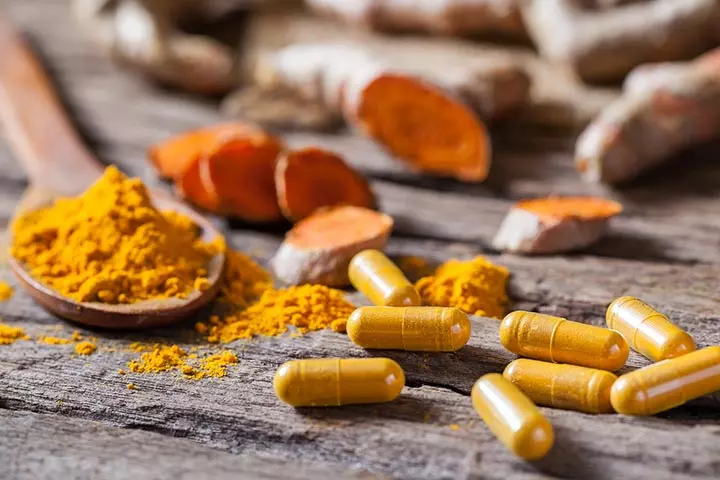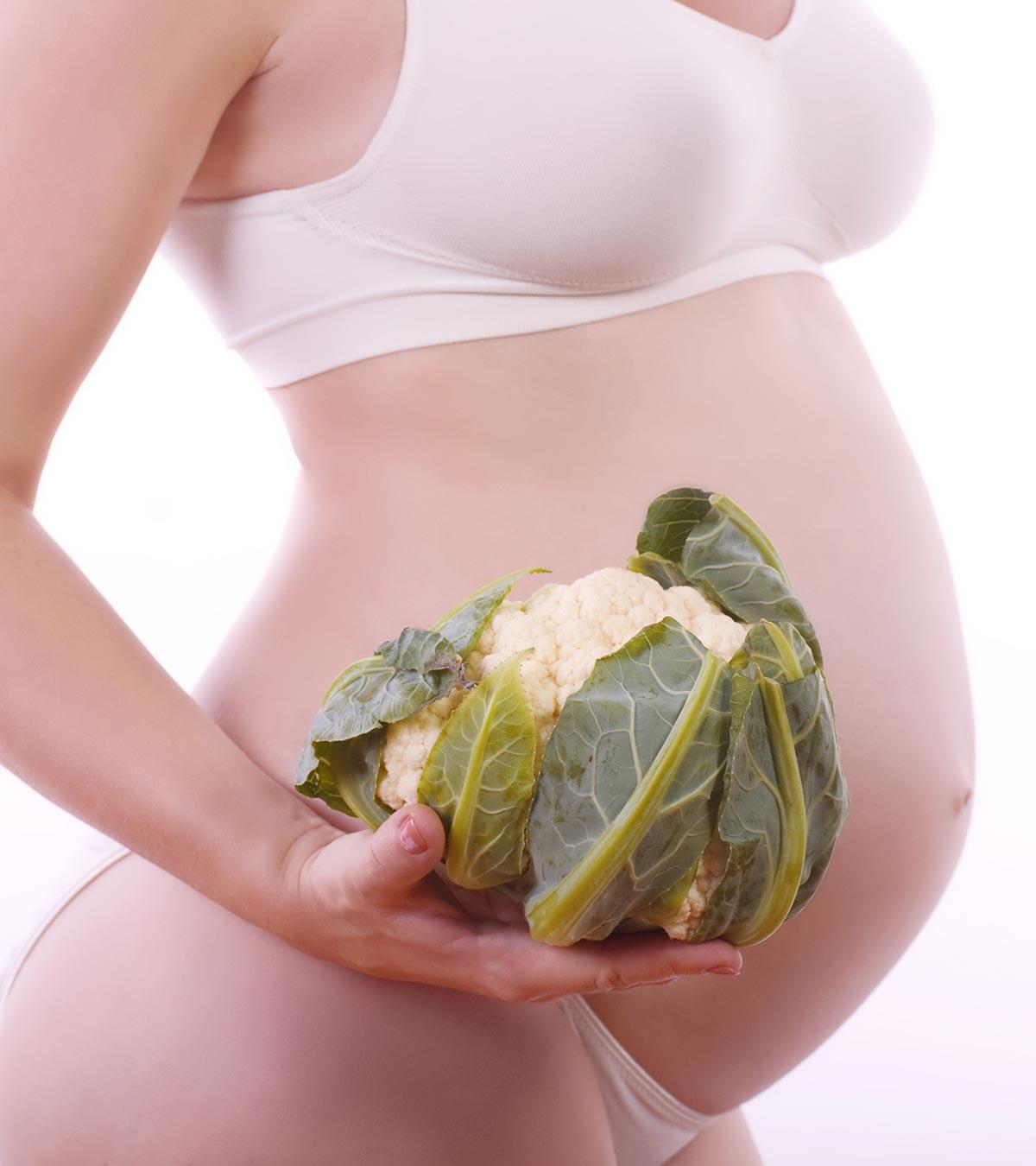
In India, turmeric is often consumed mixed in milk. This nutritious and medicinal beverage is effective for relieving a sore throat, cough, or pain due to injury. But some may wonder whether it is beneficial to drink turmeric milk during pregnancy.
Turmeric has several health benefits since it is rich in different bioactive compoundsiBeneficial chemicals found in small quantities in food or supplements and promote good health . In addition, it has proven effects against infections and inflammation.
Continue reading this post to learn more about whether drinking turmeric milk is safe during pregnancy, its health and skin benefits, and some possible side effects.
Is It Safe To Take Turmeric During Pregnancy?
As per the U.S Food and Drug Administration, turmeric is “generally regarded as safe” (GRAS) to be used as a food ingredient (1). However, any specific recommendation for pregnancy has not been documented. Therefore, you may add it in your diet in small quantities or consult your doctor about the right amounts. Jessica Houston, a trained nutritionist from Greater Orlando, Florida, says, “Turmeric-based products are likely safe when the bioavailabilityiThe ability of a particular substance to be absorbed and utilized by the body and dosage are similar to what is naturally found in foods, although each person may tolerate the products in different ways. Because the research that classifies these products as safe during pregnancy is limited, plant-based consumption is generally best when pregnant.”
Pregnant women, who regularly took small amounts of turmeric in their food, did not report any adverse effects. However, prolonged use of large doses of turmeric may cause gastrointestinal problems (2).
Is It Safe To Drink Turmeric Milk During Pregnancy?
Image: Shutterstock
It is likely safe to take a glass of warm milk with a pinch of turmeric once every few days. Milk being calcium-rich, is a major source of dietary calcium, which is essential during pregnancy (3), and turmeric being rich in antioxidants and anti-inflammatory components (4), offers double benefits.
However, you should consume it in small amounts and consult a nutritionist to know of some more ways to include turmeric into your diet safely.
 Quick tip
Quick tipNutrients And Health Benefits Of Turmeric
Image: IStock
Before understanding turmeric benefits, let’s understand what turmeric is. Turmeric, scientifically known as Curcuma longa, is a root used in medicines and food. It is one of the commonly available spices in the form of extracts, capsules, or powder. It is referred to as the “Indian saffron” due to its bright yellow color and potential therapeutic properties (5).
Nutritional facts of turmeric:
Still wondering is turmeric safe during pregancy? Let’s know more. One One tablespoon, i.e., one serving of turmeric powder, provides the following nutrients against the recommended allowances per day (RDA) (6) (7).
| Name | Amount | RDA |
|---|---|---|
| Fiber, total dietary | 2.13g | – |
| Calcium, Ca | 15.8mg | 1000mg |
| Iron, Fe | 5.17mg | 27mg |
| Magnesium, Mg | 19.6mg | 360mg |
| Phosphorus, P | 28.1mg | 700mg |
| Potassium, K | 196mg | 2900mg (AI) |
| Sodium, Na | 2.54mg | 1500mg (AI) |
| Manganese, Mn | 1.86mg | 2mg (AI) |
| Folate, total | 1.88µg | 600µg |
| Choline, total | 4.62mg | 450mg |
AI = Adequate intake (AI) is the recommended average daily intake level of apparently healthy people. It is used when an RDA cannot be determined (8).
The nutritional value of turmeric is promising. So, it is wise to check what benefits you could possibly reap from it.
Benefits Of Turmeric Milk During Pregnancy
Houston adds, “The reported anti-inflammatory, anti-hypertensive, and neuroprotective effects of curcumin are encouraging, especially for pregnancy-related disorders, including gestational diabetes, preeclampsiaiA pregnancy-related disorder characterized by the onset of high blood pressure, water retention, and protein in the urine , and postpartum depression. The body of evidence suggests that women who are pregnant or trying should consume turmeric through food, rather than as a supplement.”
It may not be safe to take turmeric as an oral supplement, but combined with milk, it might prove beneficial. Besides, it might also help treat many problems that you experience during pregnancy. Turmeric has various nutrients and some bioactive compounds such as curcumin and demethoxycurcumin that have medicinal properties. Let’s check some benefits in detail.
- Joint pains: Joint pains might primarily occur due to the burden the joints bear because of weight gain. However, sometimes joint pains during pregnancy could be due to some medical reasons such as inflammatory arthritis (9). In such scenarios, turmeric might provide some help. Due to curcumin’s strong anti-inflammatory quality, turmeric could provide symptomatic relief from joint pains and swollen legs (10).
Image: IStock
- Constipation: Some researchers have shown that curcumin is effective in relieving constipation caused by irritable bowel syndromeiA condition that affects the digestive system, leading to abdominal pain and bowel changes (11).
- Cholesterol levels: The levels of cholesterol and triglycerides increase during pregnancy as they are crucial for the growth and development of the fetus and the production of hormones (12). However, an abnormal increase in cholesterol and total fat could lead to medical complications such as acute pancreatitis. Turmeric is often seen as a natural remedy to regulate cholesterol levels. A research study demonstrated the effectiveness of turmeric extract in reducing cholesterol and triglyceride synthesis (13).
- Sore throat: Traditionally, turmeric has been in use to get relief from cold, cough, sore throat, and chest congestion. According to Ayurveda, one teaspoon of turmeric boiled in milk can help with the expectoration of mucus, and this relieves cough (14). Clinically, the efficacy of turmeric to relieve sore throat is still very limited.
Image: Shutterstock
- Immunity: Turmeric has nutrients and certain bioactive compounds that possess antioxidant properties and help remove free radicalsiHighly reactive, unstable molecules that damage cells and increase one’s risk of contracting diseases It, therefore, acts as an immunity booster by keeping away mild infections (15). Therefore, the use of turmeric to support immunity during pregnancy is a wise choice. However, consult a doctor.
- Blood purification: Blood purification is essential to keep your body free from metabolic waste and toxins. In ayurvedic and unani medicine, there is a use of turmeric to purify the blood (16). Thus, turmeric milk can be used to regulate the blood flow and improve blood circulation. However, there are no research studies to prove the safety and efficacy of turmeric as a blood purifier during pregnancy.
 Research finds
Research findsUndoubtedly, turmeric has some crucial therapeutic properties. However, there are some concerns related to the use of turmeric during pregnancy.
There are a few concerns about the adverse side-effects of turmeric use during pregnancy.
- Miscarriage: Turmeric is believed to stimulate uterine contractions and cause bleeding, especially before full term (37 weeks). This could increase the risk of miscarriages and preterm births. However, there is no evidence to prove the claim. In contrast, an in-vivo experiment conducted on rats showed that curcuminoids in turmeric have the potential to relax the uterus, an effect that could be beneficial in the cases of preterm labor (17).
- Birth defects: As per the Centers for Disease Control and Prevention (CDC) statistics, one out of every 33 babies is born with a congenital abnormality. Although there are concerns that using turmeric while pregnant could affect fetal development, scientific studies have shown that curcumin in turmeric could possibly help in reducing congenital fetal defects (18).
- Bleeding disorders: Turmeric is known to prevent the production of clotting factor and aggregation of platelets, increasing the chances of bleeding (19). However, this is a concern for women who are taking medications for bleeding concerns.
Houston observes, “While research suggests that normal doses of food-based turmeric can help lower blood sugar, megadoses may drop your blood sugar too low, especially in settings of dysregulated blood sugar. You might experience acid reflux or indigestion with too much turmeric, especially for those who already have a history of gastrointestinal issues. Turmeric supplements may affect the efficacy or increase the toxicity of a range of medications when taken together.”
Curcumin, taken orally, is neither absorbed nor metabolized properly. In fact, it is rapidly eliminated from the body. Therefore, the potential of curcumin as a harmful substance is limited by its poor bioavailability.
Turmeric supplements are also known to cause spotting as early as two days after their consumption.
Before consuming turmeric, you might want to take your doctor’s advice. But turmeric is not just restricted to its use in foods. It is good for your external body, as well.
Is It Safe To Drink Turmeric Tea During Pregnancy?
In general, turmeric tea is not considered safe during pregnancy, as the proportions of turmeric are high in it. Excess intake of this root powder can cause uterine contractions and menstrual flow.
Skin Benefits Of Turmeric During Pregnancy
Image: Shutterstock
Turmeric is believed to give a beautiful glow to your skin. Here are some ways you can try to get that smooth and supple skin during pregnancy, along with the glow.
- Treats stretch marks: Make a paste of turmeric with curd and apply it over the stomach. Leave for 15 minutes and take a bath. Using it regularly can treat the stretch marks.
- Reduces hyper-pigmentation: Blend cucumber and extract juice from it. Add lime juice and turmeric powder to make a paste. Apply the paste on the intensely pigmented area and wash off after 20 minutes. Turmeric prevents melanin production and lightens the skin tone.
- Removes pregnancy acne: The highly potent anti-inflammatory and antiseptic properties help in treating acne. A paste of turmeric and water on the acne-prone skin will work wonders.
- Gives clear complexion: Drinking turmeric milk along with honey helps cleanse the impurities from the system and provides a clear skin. Also, you can use a face pack made of turmeric, milk, curd, and gram flour.
Frequently Asked Questions
1. Will turmeric cause weight gain during pregnancy?
No, turmeric consumption does not cause weight gain in pregnancy. On the contrary, it has been associated with weight loss (21).
2. Does turmeric prevent pregnancy?
The active component of turmeric, curcumin, may modulate estrogen receptivity and inhibit the growth of endometrial cells. This effect is beneficial for treating endometriosis, but may cause hindrance in the implantation of an embryo. Further, curcumin is effective in destroying cancer cells, but the same effect may interfere with early embryonic development. Hence, turmeric may prevent pregnancy but it is subject to further research (22) (23).
3. How much turmeric milk should you drink during pregnancy?
There is no specific recommended dosage for turmeric milk during pregnancy. It’s best to consume it in moderation and consider the overall turmeric intake from other sources such as food and supplements. However, note that individual reactions to turmeric milk can vary. Hence, speak with your healthcare provider to determine a spec amount based on your specific requirements.
4. Can turmeric milk help with postpartum recovery?
Turmeric milk may have potential health benefits due to the properties of turmeric, such as anti-inflammatory and antioxidant effects (4). However, there is no scientific evidence specifically examining its role in postpartum recovery.
5. Does turmeric milk have any effect on the baby’s skin complexion?
No scientific evidence supports the claim that turmeric milk has any effect on the baby’s skin complexion. It’s important to focus on maintaining a healthy lifestyle and following your healthcare provider’s recommendations for prenatal care to support your baby’s well-being.
The medicinal properties of turmeric make it a preferred addition to the diet during pregnancy. Many women choose to have turmeric while pregnant since it is generally considered safe and provides health benefits. However, an excess intake during pregnancy may negatively impact your digestive health and sometimes cause miscarriages or congenital disabilities. In conclusion, despite its several health benefits, it is safe to consult your Ob/Gyn on its consumption to ensure a safe and risk-free prenatal care. Also, do not forget to ask for the right dosage and the right form of consumption of turmeric milk during pregnancy.
Infographic: Benefits Of Turmeric During Pregnancy
Everyone is familiar with the benefits that turmeric has to offer in skin care. But, it does not stop at just that. In the following infographic, you will find a list of benefits imparted by turmeric to pregnant women. So, give it a read and share it with those who might benefit from this information. Illustration: Momjunction Design Team
Key Pointers
- Turmeric imparts several benefits during pregnancy due to its rich bioactive components.
- Some essential benefits of turmeric include relief from joint pains, sore throat, and improved immunity.
- However, overconsumption might increase the risks of congenital disabilities in the fetus or miscarriage.
- It is advised to consult a doctor to know about the right amount of turmeric during pregnancy and avoid complications.
Image: Stable Diffusion/MomJunction Design Team
If you are pregnant and wondering if turmeric is safe to consume, then watch this video where an expert discusses the safety of turmeric in pregnancy.
References
1. Turmeric; Drugs and Lactation Database; National Center For Biotechnology Information
2. Turmeric; National Center for Complementary and Integrative Health; U.S Department of Health & Human Services
3. Beinder E; Calcium-supplementation in pregnancy–is it a must?; National Center For Biotechnology Information
4. Menon VP and Sudheer AR; Antioxidant and anti-inflammatory properties of curcumin; National Center For Biotechnology Information
5. Turmeric, the Golden Spice; Herbal Medicine: Biomolecular and Clinical Aspects. 2nd edition.; National Center For Biotechnology Information
6. Spices, turmeric, ground, (FDC ID: 172231); Food Data Central, USDA
7. Micronutrient Needs During Pregnancy and Lactation;Oregon State University
8. Adequate Intake; European Food Safety Authority
9. Inflammatory Arthritis and Pregnancy; Arthritis Foundation
10. James W. Daily et al,; Efficacy of Turmeric Extracts and Curcumin for Alleviating the Symptoms of Joint Arthritis: A Systematic Review and Meta-Analysis of Randomized Clinical Trials; National Center For Biotechnology Information
11. Matthew C.Fadus et al.; Curcumin: An age-old anti-inflammatory and anti-neoplastic agent; Science Direct
12. Pregnancy and Blood Fats; Heart UK
13. Iwan Budiman et al.; Potency of turmeric (Curcuma longa L.) extract and curcumin as anti-obesity by inhibiting the cholesterol and triglycerides synthesis in HepG2 cells; Universitas Kristen Marantha
14. Indian Myths Explored; Sutter Health
15. Jagetia GC and Aggarwal BB; “Spicing up” of the immune system by curcumin; National Center For Biotechnology Information
16. Zeinab Ghorbani et al.; Anti-Hyperglycemic and Insulin Sensitizer Effects of Turmeric and Its Principle Constituent Curcumin; National Center For Biotechnology Information
17. El-Sayed Mohamed El-Sayed; The uterine relaxant effect of curcumin in rats: An in-vitro study; Researchgate
18. Akhilesh Kumar and Vimala Bind; Curcumin bioavailability issues and its effect on birth defects; Researchgate
19. Curcumin; Oregon State University
20. Giovanni Tossetta et al.; The Multifaced Actions of Curcumin in Pregnancy Outcome; Antioxidants (Basel)
21. Tiziana Filardi et al.; Curcumin: Could This Compound Be Useful in Pregnancy and Pregnancy-Related Complications?; National Center For Biotechnology Information
22. Datu Agasi Mohd Kamal et al.; Potential Health Benefits of Curcumin on Female Reproductive Disorders: A Review; National Center For Biotechnology Information
23. Alexis A O’Connell et al.; Curcumin Supplementation and Endometrial Lining: Examining the Role and Pathophysiology of Use During Frozen-Thawed Embryo Transfer. National Center For Biotechnology Information
Read full bio of Jyoti Benjamin
- Jessica Houston is the founder and CEO of Vitamin & Me, a SAAS service that matches the user to the vitamins they need and delivers them to their doorstep. The Johns Hopkins-trained nutritionist and mother developed a nutritional-based predictive analytics model to identify subclinical disease. Her research has been published in peer-reviewed journals and books, including The Lancet.
 Jessica Houston is the founder and CEO of Vitamin & Me, a SAAS service that matches the user to the vitamins they need and delivers them to their doorstep. The Johns Hopkins-trained nutritionist and mother developed a nutritional-based predictive analytics model to identify subclinical disease. Her research has been published in peer-reviewed journals and books, including The Lancet.
Jessica Houston is the founder and CEO of Vitamin & Me, a SAAS service that matches the user to the vitamins they need and delivers them to their doorstep. The Johns Hopkins-trained nutritionist and mother developed a nutritional-based predictive analytics model to identify subclinical disease. Her research has been published in peer-reviewed journals and books, including The Lancet.
Read full bio of Swati Patwal
Read full bio of Lorraine Teron


























